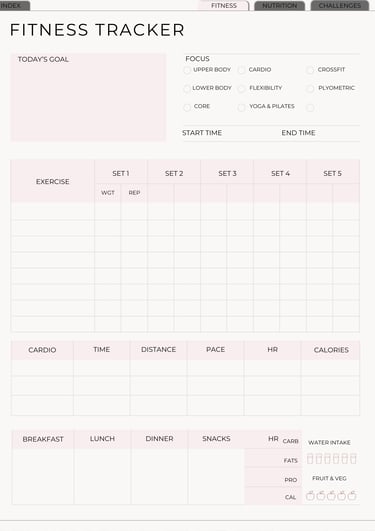Visit Innatefit1.com for exercise wear and equipment!!!
Developing Mental Toughness: 7 Beginner-Friendly Strategies for Fitness Success
Discover how to build mental resilience in fitness with these seven beginner-friendly strategies.
WORKOUTSHEALTHY LIFESTYLE
Joseph Battle
1/7/20254 min read


Introduction: Building Your Mind for Fitness Success
Focusing solely on physical changes is easy when embarking on a fitness journey—more muscular muscles, improved endurance, and a healthier body.
However, mental resilience in fitness is one of the most underestimated yet crucial factors in achieving long-term fitness goals.
This mental fortitude keeps you motivated, helps you push through plateaus, and enables you to bounce back after setbacks. Without it, even the best-laid plans can falter.
This guide is designed to help beginners cultivate mental resilience, emphasizing actionable strategies to overcome common barriers.
Whether you struggle to stay consistent or doubt your abilities, these seven beginner-friendly methods will help you develop mental toughness to conquer your fitness goals. FREE PLANNER
What Is Mental Resilience in Fitness and Why Beginners Need It
Mental resilience in fitness refers to the ability to persist through challenges, adapt to setbacks, and maintain focus on long-term goals.
The inner strength keeps you lacing up your sneakers on cold mornings or sticking to your meal plan despite temptations. This resilience is significant for beginners because the initial stages of a fitness journey are often the most challenging.
Why Mental Resilience Matters for Beginners
Facing the unknown: Starting anything new, especially fitness, can feel intimidating. Mental resilience helps you embrace the discomfort of learning and trying.
Combating unrealistic expectations: Many beginners expect instant results. Resilience keeps you grounded and reminds you that progress takes time.
Managing life’s demands: Fitness often competes with work, family, and other priorities. Mental toughness ensures your workouts don’t fall by the wayside.
Key Characteristics of Mental Resilience in Fitness
Consistency: Showing up even when you’re not motivated.
Adaptability: Adjusting your approach when things don’t go as planned.
Self-discipline: Choosing long-term benefits over immediate gratification.
Incorporating these traits into your fitness routine lays a solid foundation for success. Let’s explore how you can start building mental toughness from day one.
Breaking Through Barriers: Building Mental Toughness for Long-Term Success
Barriers—both physical and psychological—are inevitable. They’re the moments that test your commitment and separate fleeting attempts from sustained progress.
Here’s how to face these barriers head-on:
1. Identify and Acknowledge Your Barriers
Understanding what holds you back is the first step to overcoming it. Are you battling self-doubt? Struggling with time management? Recognizing these challenges allows you to tackle them directly.
2. Start Small and Build Confidence
Begin with achievable goals to build momentum. For instance, instead of committing to a daily one-hour workout, start with three 20-minute weekly sessions. Each small success reinforces your confidence. FITNESS PLANNER
3. Reframe Challenges as Opportunities
Barriers often feel like insurmountable obstacles, but they’re opportunities to grow. Struggling with a challenging workout? Celebrate the fact that you’re pushing your limits.
4. Use Visualization
Mental toughness often starts with a mindset. Visualize yourself succeeding—whether that’s completing a race or simply showing up to the gym—to stay motivated.
Developing Mental Toughness by Embracing Setbacks as Growth Opportunities
Setbacks are inevitable in fitness, whether skipping a workout, getting injured, or hitting a plateau. However, the way you respond to these moments defines your resilience.
1. Normalize Setbacks
Remind yourself that everyone faces challenges. Missing one workout or indulging in an unhealthy meal doesn’t erase your progress.
2. Reflect on Lessons
Every setback carries a lesson. Maybe skipping workouts requires better time management, or a plateau signals the need to adjust your routine.
3. Avoid Negative Self-Talk
Replace thoughts like “I’ll never get fit” with constructive affirmations such as “I’m learning and improving daily.”
4. Seek Support
Talk to friends, join fitness communities, or work with a trainer to stay accountable and motivated during tough times.
Creating a Routine to Strengthen Mental Resilience in Fitness
A solid routine doesn’t just make fitness more manageable—it reinforces mental resilience. Consistency is key to forming habits that stick.
1. Schedule Workouts
Treat your workouts like appointments. Schedule them and prioritize them like you would a work meeting. FITNESS PLANNER
2. Develop Rituals
Small rituals can help signal your brain that it’s time to exercise. For instance, laying out workout clothes the night before sets the tone for a morning session.
3. Track Your Progress
Logging your workouts, meals, or other milestones keeps you motivated and helps you identify patterns over time.
4. Celebrate Small Wins
Acknowledge each victory, no matter how minor. Did you exercise three times this week? That’s a win!
Staying Focused on Progress, Not Perfection
Fitness is a journey, not a destination. It is crucial to focus on steady improvement rather than striving for an unattainable ideal.
1. Set Realistic Goals
Avoid setting goals like “lose 20 pounds in a month” or “never miss a workout.” Instead, aim for measurable, realistic targets.
2. Practice Gratitude
Appreciate what your body can do today, whether walking a mile or lifting a lightweight.
3. Avoid Comparison
Your journey is unique. Comparing yourself to others—online or in real life—can derail your confidence.
4. Embrace the Process
Fall in love with the daily fitness actions, like the endorphin rush after a workout or the satisfaction of eating a nutritious meal.
Conclusion: Your Mental Resilience Toolkit for Fitness
Developing mental toughness isn’t a one-time effort; it’s a skill you build and refine over time. By embracing setbacks, creating routines, and focusing on progress, not perfection, you can cultivate the mental resilience needed to achieve long-term fitness success.
Remember, the strongest muscles you build on this journey are the ones in your mind.




